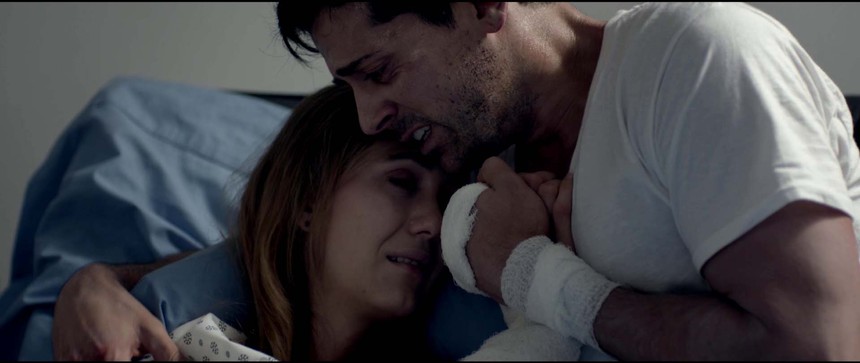Review: PAINKILLERS (2018), a serviceable and relatable psychological thriller

It’s not uncommon for horror pictures to utilise a real-life situation in order to develop a more fictional —or fantastical— story. However, this can lead to misconceptions regarding different ideas, conditions or sicknesses —consider, for example, movies like “Orphan”, which certainly did no favours to those with parents unknown. On the other hand, though, some films can utilise real-life concepts in a such a way that it doesn’t feel disrespectful, developing an intriguing story while fictionalising reality in a credible manner. Using real life diseases or conditions in order to convey cheap scares is easy. Doing it the right way, as a basis for something that feels more honest and believable, is quite harder.
And although “Painkillers” is not a perfect example of what can be done with such concepts, it certainly is a serviceable psychological thriller. What’s most interesting, though, is that is utilises something that hasn’t been seen all that frequently in modern horror films: chronic pain. Horror cinema has almost always focused on short-term pain: torture, mutilations, accidents, and of course, horrible deaths. But chronic pain, which requieres a more careful approach, has seldom been seen in films such as “Painkillers” —they tend to focus on the supernatural as a cause for short-term pain, instead of something that’s more real and certainly more relatable. The mere fact that director Roxy Shih and writer Giles Daoust have tried to tackle something so original and unpredictable should be applauded.
“Painkillers” tells the story of John Clarke (Adam Huss), a brilliant surgeon who, plagued by guilt following the death of his son in a car crash, realises that the only thing that eases his pain is the taste of human blood. He comes to this conclusion thanks to the advice of his mentor, Harb (Gran Bowler), who is strangely convincing, despite his crazy theories. Of course, nobody’s saying that John is turning into a vampire or anything like that, but considering his newfound taste for blood, who could be blamed for thinking it? Actually, a lot of comparisons can be made between John’s condition in “Painkillers” and classic vampire stories, even though the movie is not necessarily a supernatural tale. It’s an interesting approach, to be sure, but one that doesn’t really work all the time.
In fact, “Painkillers” is at its most interesting when it deals with John’s pain, and the questions he asks himself about the drinking of human blood. About the former, even though I personally haven’t experienced chronic pain, I must say it seems to have been portrayed in a believable manner, and about the latter, it is here that John is developed as a fully-fledged protagonist. His moral quandaries are difficult and relatable, and the way he reacts to his new condition is surprisingly heartfelt, even hard to watch at times. Neither the movie nor the characters seem to be treating his situation as a supernatural thing, or as a reference to fantasy stories or legends —the comparison is more subtextual, which makes it easy for the viewer to interpret it the way he or she wants. I would recommend taking the story at face value —if one starts to consider vampirism or other such concepts, “Painkillers” start to fall apart, feeling more like a farce than an actual horror picture.
Additionally, even though John is developed as an intriguing protagonist throughout most of the movie, it is during the last thirty minutes or so of runtime that he starts to make some baffling decisions, making it hard for the viewer to actually sympathise with him. Plot threads are resolved much too quickly —or not solved at all—, and the way he simply decides to stop thinking about the tragedy he just experienced simply feels… wrong. “Painkillers” deals very maturely with themes such as post-traumatic stress —well, at least in the beginning— and controversial medical treatments, but when it comes to addiction, and the way it can affect an everyday normal guy… well, let’s just say it’s not very interested in developing it very thoroughly. More could have been done with the consequences of drinking blood for an extended period of time, as a short-term solution for a long-term problem.
Adam Huss is quite good as John —believable both as a brilliant surgeon, and as a suffering patient. One understands his problem and the way it connects to the car crash in which he lost his son, as well as the moral questions he keeps asking himself. His condition takes a big toll on him, both physically —yes, yes, he turns pale as a vampire— and mentally, which turns him into quite the fascinating protagonist… that is, of course, until, the last thirty minutes or so. As Chloe (John’s wife), Madeleine Zima is excellent; she’s very good at conveying the way Chloe is suffering both due to John’s sickness and the way he starts to drift apart, turning her into quite the tragic figure. And as Harb, Grant Bowler is both intense and elegant, making sure the audience knows exactly what kind of man he is.
“Painkillers” is the rare psychological thriller that manages to be both scary and dramatically believable. There are supernatural undertones, yes, but they never become too obvious or intrusive, and although character development takes a really weird turn during the last few scenes, the film manages to develop John as an intriguing human being; as a man who depends on something most people wouldn’t even dare to try, and who copes with pain and suffering in a very unpredictable (but relatively understandable) way. It might not be the scariest horror picture ever, and it might not have a particularly complex plot, but thanks to its credible portrayal of chronic pain, strong performances, and suspenseful sequences, “Painkillers” ends up being a constantly tense and surprisingly relatable experience.








